|
|
|
Sort Order |
|
|
|
Items / Page
|
|
|
|
|
|
|
| Srl | Item |
| 1 |
ID:
129894
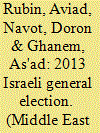

|
|
|
|
|
| Publication |
2014.
|
| Summary/Abstract |
Despite resulting in a different party configuration, the results of the 2013 Israeli general election support a similar agenda to the one set by the previous government. A year following its establishment, all indicators suggest that the current government continues to deepen neoliberal policies. Nevertheless, this election reflects two important trends: first, an ever growing discontent in Israeli public that probably would not find a solution during the tenure of the incoming government; second, lack of interest in the Israeli-Palestinian conflict that might generate negative long-term consequences.
|
|
|
|
|
|
|
|
|
|
|
|
|
|
|
|
| 2 |
ID:
165826
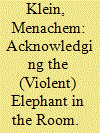

|
|
|
|
|
| Summary/Abstract |
Any solution to the Israeli-Palestinian conflict will likely lead to an armed revolt or even a civil war of some dimension, unless we address the question of how to reduce the potential damage in such an eventuality.
|
|
|
|
|
|
|
|
|
|
|
|
|
|
|
|
| 3 |
ID:
154328
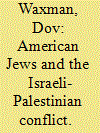

|
|
|
|
|
| Summary/Abstract |
Analyzes the role played by American Jews and American Jewish pro-Israel organizations in the conflict between Israel and the Palestinians. He challenges the popular notion that the pro-Israel lobby powerfully influences U.S. policy pertaining to the Israeli-Palestinian conflict.
|
|
|
|
|
|
|
|
|
|
|
|
|
|
|
|
| 4 |
ID:
154303
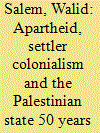

|
|
|
|
|
| Summary/Abstract |
With the Palestinians facing a belligerent occupation, an apartheid system that favors Jewish settlers and a growing settler colonial project, the Israeli-Palestinian conflict is becoming chronic, an ongoing Nakba.
|
|
|
|
|
|
|
|
|
|
|
|
|
|
|
|
| 5 |
ID:
149804
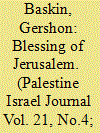

|
|
|
|
|
| Summary/Abstract |
The status of Jerusalem is the biggest challenge in the Israeli-Palestinian conflict. It is in Jerusalem where we will determine whether peace can be a reality.
|
|
|
|
|
|
|
|
|
|
|
|
|
|
|
|
| 6 |
ID:
090861


|
|
|
|
|
| Publication |
2009.
|
| Summary/Abstract |
This article investigates the limitations of peace theory in comparing and contrasting strategies adopted by activist groups working to resolve conflicts of varying types in varying contexts. Using the case of seven Israeli and Palestinian peace and justice groups that remained active after the collapse of the Camp David negotiations and the outbreak of the Second Intifada, the article illustrates the benefits of a process-based approach to peacebuilding for examining how, why, and to what extent approaches used by these groups changed between 2004-05 and 2008. The findings highlight how domestic, regional, and international changes have affected the operation of peace and justice activists, and suggest that those interested in progress towards a negotiated peace agreement should not assume that past policy instruments will work in the current environment.
|
|
|
|
|
|
|
|
|
|
|
|
|
|
|
|
| 7 |
ID:
127334
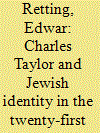

|
|
|
|
|
| Publication |
2013.
|
| Summary/Abstract |
The Jewish world is losing its ability to discuss its cultural differences. Our intra-Jewish dialogue is becoming less coherent. Indeed, the very ideas underlying our Jewish identities, ideas shaped by our language of values, are diverging. The language we use to describe our values is becoming more specific to the respective Jewish communities to which we belong, in Israel and in the Diaspora. We could be heading for a crisis.
|
|
|
|
|
|
|
|
|
|
|
|
|
|
|
|
| 8 |
ID:
126902
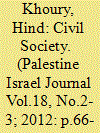

|
|
|
|
|
| Publication |
2012.
|
| Summary/Abstract |
If we contrast the era of the Arab Spring with the continuation of the prolonged Israeli occupation of the Palestinian territories and a futile peace process, now more than ever, we need a civil society that is able to mobilize the political, social, economic, cultural and human potential of our societies for social change. For it is only through a truly democratic, informed and mobilized public that we can finally overcome a culture of war, human suffering and the tenacious lack among some of the main actors of a true political will for real, just and sustainable peace.
|
|
|
|
|
|
|
|
|
|
|
|
|
|
|
|
| 9 |
ID:
127336
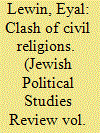

|
|
|
|
|
| Publication |
2013.
|
| Summary/Abstract |
Almost thirty-five years after Camp David and twenty years after the Oslo Accord, a fundamental question remains unanswered: does the majority of the Israeli public support a left-wing or right-wing ideology? The answer, in a democratic system, should be obvious, since elections are supposed to give a clear picture of the political preferences of the voting public. However, Israeli polls are misleading. After the Yom Kippur disaster in 1977, Menachem Begin won his premiership running as the hawkish leader who never would surrender even one grain of sand from the Land of Israel. Yet after he personally gave up the entire Sinai Peninsula his party won an even greater majority in 1981.1 Yitzhak Rabin won his premiership in 1992 representing the hawkish section of the Labor party with declarations that he would never negotiate with the PLO;2 yet it seems that signing the Oslo Accords led him, rather, to the peak of his popularit.
|
|
|
|
|
|
|
|
|
|
|
|
|
|
|
|
| 10 |
ID:
164984
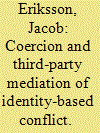

|
|
|
|
|
| Summary/Abstract |
This article analyses third-party mediation of identity-based conflicts, which are notoriously difficult to resolve. It seeks to reconcile the contradiction in the mediation literature between the need for less coercive strategies to ensure ownership of a peace agreement and the need for more coercive strategies to reach a final agreement. Through an analysis of mediation of the Israeli-Palestinian conflict, the article makes four contributions to existing literature. First, the article develops a theoretical ‘best fit’ model that proposes a u-shaped relationship between intensity of mediator coercion and transition through phases of negotiation. Second, it challenges the prevailing notion that pre-negotiation does not involve coercion. Third, it suggests that epistemological and ontological understandings of a conflict and the role of a mediator by both the mediator and the parties mean that mediators enjoy limited capacity to effectively shift from high- to low-coercive strategies. Multi-party mediation can provide the flexibility needed to execute the coercion u-curve effectively. Fourth, it challenges existing understandings of the US-mediated negotiations during the Annapolis process, 2007–08.
|
|
|
|
|
|
|
|
|
|
|
|
|
|
|
|
| 11 |
ID:
177514
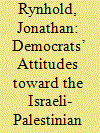

|
|
|
|
|
| Summary/Abstract |
Since 2015, there has been a sharp turnaround in US Democrats’ sympathies for Israel and the Palestinians. The percentage of Democrats with a preference for Israel is more or less tied with those preferring the Palestinians, wiping out Israel's historic advantage. Long-term processes of liberalization and secularization have generated a more difficult environment for Israel and a more favorable one for the Palestinians, but they alone do not account for the shift. Rather, the fusing of these trends with changes in Israel triggered the change. The formation of a narrow right-wing government in 2015 played a significant role. However, the primary cause of the collapse in sympathy for Israel was the way in which Prime Minister Benjamin Netanyahu's Republican-first strategy to block the Iran nuclear deal turned Israel into a highly salient motif of partisanship at a time of unparalleled hostility between the two major US parties. While the fall in sympathy for Israel spans both wings of the Democratic Party, the sharp increase in sympathy for the Palestinians has occurred primarily among liberal Democrats. It is intertwined with the growing political salience of Black Lives Matter, which helps to generate a narrative associating racial discrimination in America with the plight of the Palestinians.
|
|
|
|
|
|
|
|
|
|
|
|
|
|
|
|
| 12 |
ID:
157983
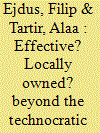

|
|
|
|
|
| Summary/Abstract |
The European Union Police Mission for the Palestinian Territories (EUPOL COPPS) was established in 2006 to contribute to the establishment of effective policing in support of an independent and democratic Palestinian state. EUPOL COPPS is often commended for its contribution to the professionalization of the Palestinian security sector under local ownership. Drawing on 40 interviews, we argue that the mission can be considered effective and locally owned only from a narrow technocratic perspective, which denies the political reality of continued occupation and absence of democracy. A broader analysis, which includes the voices of ordinary Palestinians, reveals that EUPOL COPPS contributed to the professionalization of authoritarian policing under continued Israeli occupation. Our findings show the limits of technocratic approaches to peacebuilding interventions and call for a stronger engagement with the ultimate beneficiaries of peacebuilding missions.
|
|
|
|
|
|
|
|
|
|
|
|
|
|
|
|
| 13 |
ID:
131347
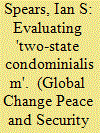

|
|
|
|
|
| Publication |
2014.
|
| Summary/Abstract |
At a time when Israelis and Palestinians are gathering in Washington to consider peace in the Middle East, most attention is focused on the idea of a one-state or, more likely, two-state solution. A number of scholars, however, have recently developed a third approach which has been appropriately referred to as a 'two-state condominialism'. This approach seeks to overcome the liabilities of the two existing approaches to solving the Middle East conflict while offering a number of its own advantages. Surprisingly, in spite of the similarities among their proposals, none of the authors make reference to, or even acknowledge each other. This article reviews these papers as a collective and considers whether they offer a realistic opportunity for peace in the Middle East.
|
|
|
|
|
|
|
|
|
|
|
|
|
|
|
|
| 14 |
ID:
127333
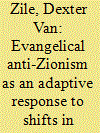

|
|
|
|
|
| Publication |
2013.
|
| Summary/Abstract |
Since the founding of the Jewish state in 1948, Evangelical Protestants in the United States have been regarded-with good reason-as Israel's most reliable supporters. In 2008, Jody C. Baumgartner and a number of other researchers reported that Evangelicals are "more likely than other Americans to have sympathy for Israel in its dispute with the Palestinians and to agree that the United States should take Israel's side more often in the Middle East."1 More recently, a poll conducted by the Pew Charitable Trust indicated that Evangelicals are more likely than other American Jews to believe that God gave the land to the Jewish people.2 In addition to the belief that God's promises endure forever, much Evangelical support for Israel is motivated by an understanding of the religious component of Arab hostility toward Israel. Evangelicals, Baumgartner and her colleagues reported, are "significantly more likely than other Americans to agree that Islam is a more violent religion than Christianity, Judaism, or Hinduism."3 Other factors related to Evangelical support for Israel include an adherence to premillenial dispensationalism (an eschatology that posits that the return of the Jews to their homeland is a precursor to the return of Jesus Christ),4 gratitude to the Jewish people for their scriptures, and remorse over the Holocaust.5
|
|
|
|
|
|
|
|
|
|
|
|
|
|
|
|
| 15 |
ID:
156655
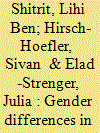

|
|
|
|
|
| Summary/Abstract |
The relationship between gender and political aggression is hotly debated and the empirical evidence is often mixed. While many surveys find a gender gap, with women less supportive of politically motivated aggression and violence than men, numerous case studies point to women’s active involvement in political violence and refute the association of women with peacefulness. This article argues that the gender–aggression relation depends upon (1) the type of political aggression under study (i.e. direct vs. indirect political aggression), and (2) contextual factors, notably the salience of a protracted conflict. Using original datasets representing Israeli Jews (N = 3,126) we found that in the context of protracted conflict, gender has a unique effect on support for indirect forms of political aggression, over and above other central predictors of political aggression (i.e. political orientation and threat perceptions), such that women are actually more supportive of politically motivated social distancing and exclusion of out-groups in conflict as compared to men. Women and men, however, do not differ in their support for direct, politically motivated, violent acts against government officials. Results also shed light on potential mechanisms underlying these differences (and lack thereof), in the context of protracted conflict. The findings cast further doubt on the stereotype of ‘peaceful women’ and point to the need for policymakers concerned with conflict resolution to address context-related factors when considering the gender-based differences in political aggression.
|
|
|
|
|
|
|
|
|
|
|
|
|
|
|
|
| 16 |
ID:
130501
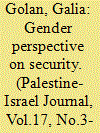

|
|
|
|
|
| Publication |
2011.
|
| Summary/Abstract |
The Van Leer Program on Women in Public Life recently held a discussion on gender perspectives on issues in the Israeli-Palestinian conflict. Women dealt with the core issues of the conflict, namely borders, settlements, refugees, etc. in an attempt to determine if a gender perspective would add or otherwise change the negotiators' approach to these issues. This was not the often-held discussion on women and peace or whether or not women are more peace-loving than men, but rather an effort to see if a look at the issues through a different lens might produce a different approach or suggest something not noticed before. One of these issues is that of security arrangements - an area generally perceived to be the exclusive domain of former military or security figures, most of whom are male.
|
|
|
|
|
|
|
|
|
|
|
|
|
|
|
|
| 17 |
ID:
161597
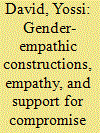

|
|
|
|
|
| Summary/Abstract |
The goal of the present study was to investigate how empathy and gender-empathic constructions affect the levels of support for political compromise in an intractable conflict. Gender-empathic constructions relate to perceptions that individuals hold about self or others as having feminine-empathic gender traits. We hypothesized that empathy will be positively associated with support for compromise, but that perceiving one’s own group as feminine empathic will be negatively associated with such attitudes, with empathy being a significant mediator. Data were collected through a public opinion survey conducted with a representative sample of Israeli-Jewish adults (N = 511). The findings supported our hypotheses, thus indicating that perceiving one’s own group as having feminine-empathic traits and empathy toward opponents made significant contributions to explaining Jewish-Israeli willingness to compromise with Palestinians. The implications of our findings for understanding the role of gender-empathic constructions and of empathy in conflict resolution are discussed.
|
|
|
|
|
|
|
|
|
|
|
|
|
|
|
|
| 18 |
ID:
158139
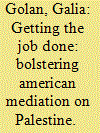

|
|
|
|
|
| Summary/Abstract |
Inasmuch as the 2015 Israeli elections brought to power a Netanyahu-led coalition even more ideologically opposed to the creation of a Palestinian state than the previous coalitions, the absence of political will to reach agreement would appear to prejudge the outcome of any future negotiations should they take place. For this reason, recommendations to improve American mediation efforts remain in the realm of theory, but nevertheless may provide useful suggestions for the more basic step of returning the sides to serious negotiations.
|
|
|
|
|
|
|
|
|
|
|
|
|
|
|
|
| 19 |
ID:
183004
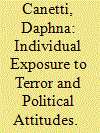

|
|
|
|
|
| Summary/Abstract |
How does exposure to terrorism affect political attitudes? This paper presents a new individual-level psychobiological model of political attitudes. Using a unique individual-level data of personal exposure to terrorism, a physiological marker of inflammation (CRP) and a psychological measure of perception of threat to an ongoing conflict—the Israel-Palestinian Conflict—we assess the effect of personal exposure to terrorism on militant attitudes concerning the conflict. Our data of physiological (blood samples), psychological, and attitudinal factors were collected in Israel during a military escalation along the Gaza Strip border. The findings reveal that among people personally exposed to terrorism, the perception of threat mediates an association between physiological conditions and militant attitudes. These findings contribute to the emerging literature on the biopolitics of political violence, suggesting a renewed focus on the dynamic interplay between physiological, psychological, and political factors.
|
|
|
|
|
|
|
|
|
|
|
|
|
|
|
|
| 20 |
ID:
124360
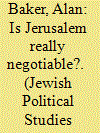

|
|
|
|
|
| Publication |
2012.
|
| Summary/Abstract |
On August 21, 2012, Palestinian Authority leader Mahmoud Abbas, referring to "the alleged [Jewish] Temple" in Jerusalem, stated that "there will be no peace, security, or stability unless the occupation, its settlements and settlers will be evacuated from our holy city and the eternal capital of our state."1 This statement, basically denying any Jewish linkage or right to Jerusalem, uttered by the head of the Palestinian Authority who is considered in the international community to be moderate and reasonable, serves as an example of the tremendous political, historical, psychological, legal, and religious challenge that the issue of Jerusalem poses to the Middle East negotiating process. This study analyzes the various aspects of this challenge, with a view to determining why a resolution of the Jerusalem question has defied all past negotiators, raising serious questions about the possibility of reaching agreement between the parties regarding Jerusalem. Beginning with a brief summary of the significance of Jerusalem to each religious community as well as to the world at large, this study analyzes the various international instruments making reference to Jerusalem, and lists proposals published over the years for solving the issue of Jerusalem.
|
|
|
|
|
|
|
|
|
|
|
|
|
|
|
|
|
|
|
|
|